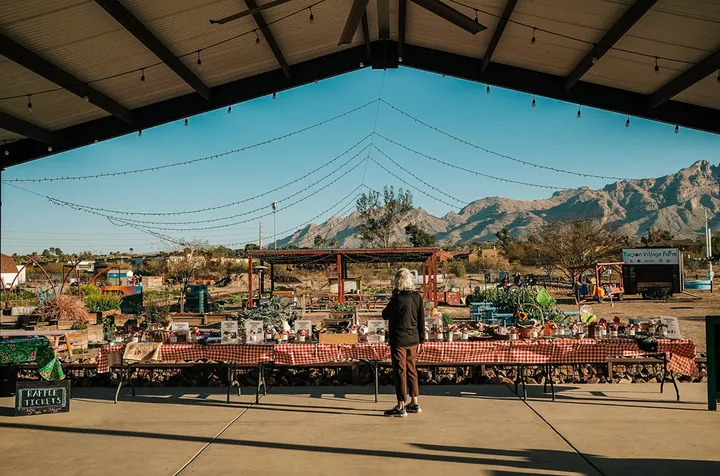Tucson advocates push to protect Medicaid, SNAP
At a post–Mother’s Day event in Tucson, advocates, community leaders, and mothers gathered to defend Medicaid and SNAP, emphasizing their vital role in helping Arizona families survive and thrive.

On the heels of Mother’s Day, the Children’s Action Alliance gathered mothers, advocates and community leaders in Tucson to defend Medicaid and SNAP, lifelines that have helped thousands of Arizona families survive hardship and find stability.
Held at the Community Foundation for Southern Arizona, the event was more than a policy discussion. It was a living testimony to what happens when safety net programs work and a warning about what’s at stake if they’re taken away.
The event was part of CAA’s “For Moms, Protect Medicaid and SNAP” campaign, a public call to safeguard health care and food assistance for families across Arizona.
Four years ago, attendee Ariel Parker was homeless, addicted to heroin and alcohol, and struggling to survive.
“It was really scary because I didn’t think I could do anything,” she said. “All I did was make mistakes in my life.”
When she was finally provided access to essential services, her situation began to change.
“Without Medicaid, I wouldn’t have been able to afford rehab,” she said. “Without SNAP, I wouldn’t have had food while I was rebuilding.”
With help from COPE Community Services, Parker entered treatment. From there, she got into stable housing, found work as a receptionist, and eventually became a job coach.
Now, she’s a program manager at Beacon Group, helping people with disabilities find careers.
“The independence I felt when I moved in there (first apartment) was unmatched,” she said. “If you had asked me four years ago where I would be, I would not be able to even imagine where I’m at now.”
Parker’s story is a testament to why safety net programs matter—and what happens when they work.
CAA Executive Director January Contreras reminded attendees what’s at stake for families across Arizona, saying there are mothers working hard—sometimes at multiple jobs—who still don't have access to health care.
Contreras pointed to the group’s Families First Forum last year, where experts across the state explained how public benefits prevent deeper problems like family separation, food insecurity and emergency room visits.
Cuts to these benefits, she said, would only exacerbate these challenges.
Contreras called Medicaid “fundamental,” a sentiment echoed by nearly every speaker who followed and spoke about how these government-funded services provide people with a roof over their heads, food, and the opportunity to recover and heal.
Tucson Police Capt. Cindy Mechtel works with the department’s Community Engagement Division and its Community Outreach Resource and Engagement Unit, which connects people experiencing homelessness with services.
“It’s a really unique opportunity for us to engage with people in crisis,” she said. “Medicaid overall is just such an essential, fundamental piece of what we need to help those in crisis and those who are just down on their luck.”
Mechtel said the fentanyl crisis, mental health needs and chronic homelessness aren’t problems any one agency can solve—and there’s no one-size-fits-all solution.
“Prevention is really what’s going to move the needle in the direction we need to go,” she said.
Prevention starts with Medicaid, affordable housing, food stamps and other resources that help people before they reach a breaking point, Mechtel said.
Lydia Aranda, director of the Arizona Hispanic College Fund, pushed back against the narrative that social services are simply budget items, saying people are often bogged down in data and heartbreaking stories. She challenged attendees to look past headlines and statistics.
“One of the ways we can support our moms, our grandmas, our sisters and our daughters is by making sure that programs like Medicaid are well-funded. Because these women are often the ones holding it all together,” she said. “We may not be able to erase homelessness or prevent every eviction, but we can make sure not to make it worse by removing the very tools people rely on to survive.”
Aranda praised organizations that provide housing and wraparound services and called for collaboration—not cuts.
“Affordable housing is not a singular issue. It’s layered, it’s complex. But organizations like (these) help make it manageable by keeping people at the center,” she said.
Past South Tucson Vice Mayor Herman Lopez said that in his community, many elderly residents are helping raise their grandchildren. Programs like Medicaid are crucial for families like these, where grandparents are often caregivers on fixed incomes, Lopez said.
“We all pray things are going to go right, but sometimes things just don’t,” Lopez said.
As the event wrapped up, CAA’s Contreras reminded the room that advocacy is a shared effort and encouraged them to protect what’s working and center the voices of people who are often overlooked: the caretakers holding it all together and families still waiting to be heard.
“We want to bring people together to encourage us to recognize that your voices have been making a difference,” she said.
Angelina Maynes is a University of Arizona alum and reporter with Tucson Spotlight. Contact her at angelinamaynes@arizona.edu.
Tucson Spotlight is a community-based newsroom that provides paid opportunities for students and rising journalists in Southern Arizona. Please support our work with a paid subscription.



